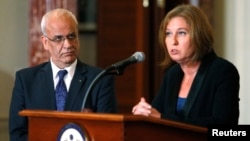JERUSALEM —
Israel's top peace negotiator said on Friday newly resumed talks with the Palestinians also held a wider opportunity for Israel to seek alliances with Arab world moderates against militants in the Middle East.
The U.S.-brokered talks were renewed last month after a three-year standoff, the latest session on Wednesday coming amid a row over new plans by Israel to expand its enclaves in territory Palestinians want for a state.
The sides have provided little detail about the talks, hoping a lower profile may help them reach Washington's ambitious goal of reaching a deal for Palestinian statehood in nine months, despite wide gaps over key issues.
Israel's Justice Minister Tzipi Livni, speaking after meeting about the negotiations with visiting U.N. Secretary-General Ban ki-Moon on Friday, declined to say whether any progress had been made.
She said the talks have provided an opening "not only to relaunch negotiations but also to change the allies and alliances in the region."
"I believe there are parts in the Arab world that for them relaunching the negotiations can be an opportunity to support this and to work together against the extremists," she added, alluding to the turmoil in Egypt and Syria's civil war.
Palestinian President Mahmoud Abbas said at a meeting with Ban on Thursday, the negotiations with Israel had thus far dealt with "all the final status issues" but that it was "too early to say whether we've accomplished anything or not."
The Arab League, Jordan and Egypt's military-led government that deposed Muslim Brotherhood rulers last month have welcomed the resumption of peace talks, also with backing from the Arab League whose 2002 peace initiative remains on the table for possible recognition of Israel after the dispute is resolved.
Israel has peace treaties with two Arab countries, Egypt, signed in 1979, and Jordan, in 1994, but remains technically at war with much of the Arab world since the conflict over Israel's founding in 1948.
Ban 'deeply troubled'
Ban said in his Ramallah talks with Abbas he was "deeply troubled by Israel's continuing settlement activity in the West Bank, including East Jerusalem."
The U.N. chief was referring to plans for some 1,200 new housing units in the territory Israel captured in a 1967 war that Israel published ahead of this week's talks.
Ban praised Israel's release of 26 of the 104 prisoners promised under a deal that led to resuming peace talks, but expressed concern for 5,000 other Palestinians in Israeli jails, some of whom have been on intermittent hunger strikes.
Israeli Defense Minister Moshe Yaalon said he told Ban that Hezbollah guerrillas in Lebanon are violating a 2006 ceasefire with activity close to Israel's border, such as weapons depots in south Lebanese villages.
Israel was worried about conflict in neighboring countries, he said in a statement released by his office: "The Middle East is in the throes of a strategic earthquake and there will be instability in the region for a long time to come."
The U.S.-brokered talks were renewed last month after a three-year standoff, the latest session on Wednesday coming amid a row over new plans by Israel to expand its enclaves in territory Palestinians want for a state.
The sides have provided little detail about the talks, hoping a lower profile may help them reach Washington's ambitious goal of reaching a deal for Palestinian statehood in nine months, despite wide gaps over key issues.
Israel's Justice Minister Tzipi Livni, speaking after meeting about the negotiations with visiting U.N. Secretary-General Ban ki-Moon on Friday, declined to say whether any progress had been made.
She said the talks have provided an opening "not only to relaunch negotiations but also to change the allies and alliances in the region."
"I believe there are parts in the Arab world that for them relaunching the negotiations can be an opportunity to support this and to work together against the extremists," she added, alluding to the turmoil in Egypt and Syria's civil war.
Palestinian President Mahmoud Abbas said at a meeting with Ban on Thursday, the negotiations with Israel had thus far dealt with "all the final status issues" but that it was "too early to say whether we've accomplished anything or not."
The Arab League, Jordan and Egypt's military-led government that deposed Muslim Brotherhood rulers last month have welcomed the resumption of peace talks, also with backing from the Arab League whose 2002 peace initiative remains on the table for possible recognition of Israel after the dispute is resolved.
Israel has peace treaties with two Arab countries, Egypt, signed in 1979, and Jordan, in 1994, but remains technically at war with much of the Arab world since the conflict over Israel's founding in 1948.
Ban 'deeply troubled'
Ban said in his Ramallah talks with Abbas he was "deeply troubled by Israel's continuing settlement activity in the West Bank, including East Jerusalem."
The U.N. chief was referring to plans for some 1,200 new housing units in the territory Israel captured in a 1967 war that Israel published ahead of this week's talks.
Ban praised Israel's release of 26 of the 104 prisoners promised under a deal that led to resuming peace talks, but expressed concern for 5,000 other Palestinians in Israeli jails, some of whom have been on intermittent hunger strikes.
Israeli Defense Minister Moshe Yaalon said he told Ban that Hezbollah guerrillas in Lebanon are violating a 2006 ceasefire with activity close to Israel's border, such as weapons depots in south Lebanese villages.
Israel was worried about conflict in neighboring countries, he said in a statement released by his office: "The Middle East is in the throes of a strategic earthquake and there will be instability in the region for a long time to come."





